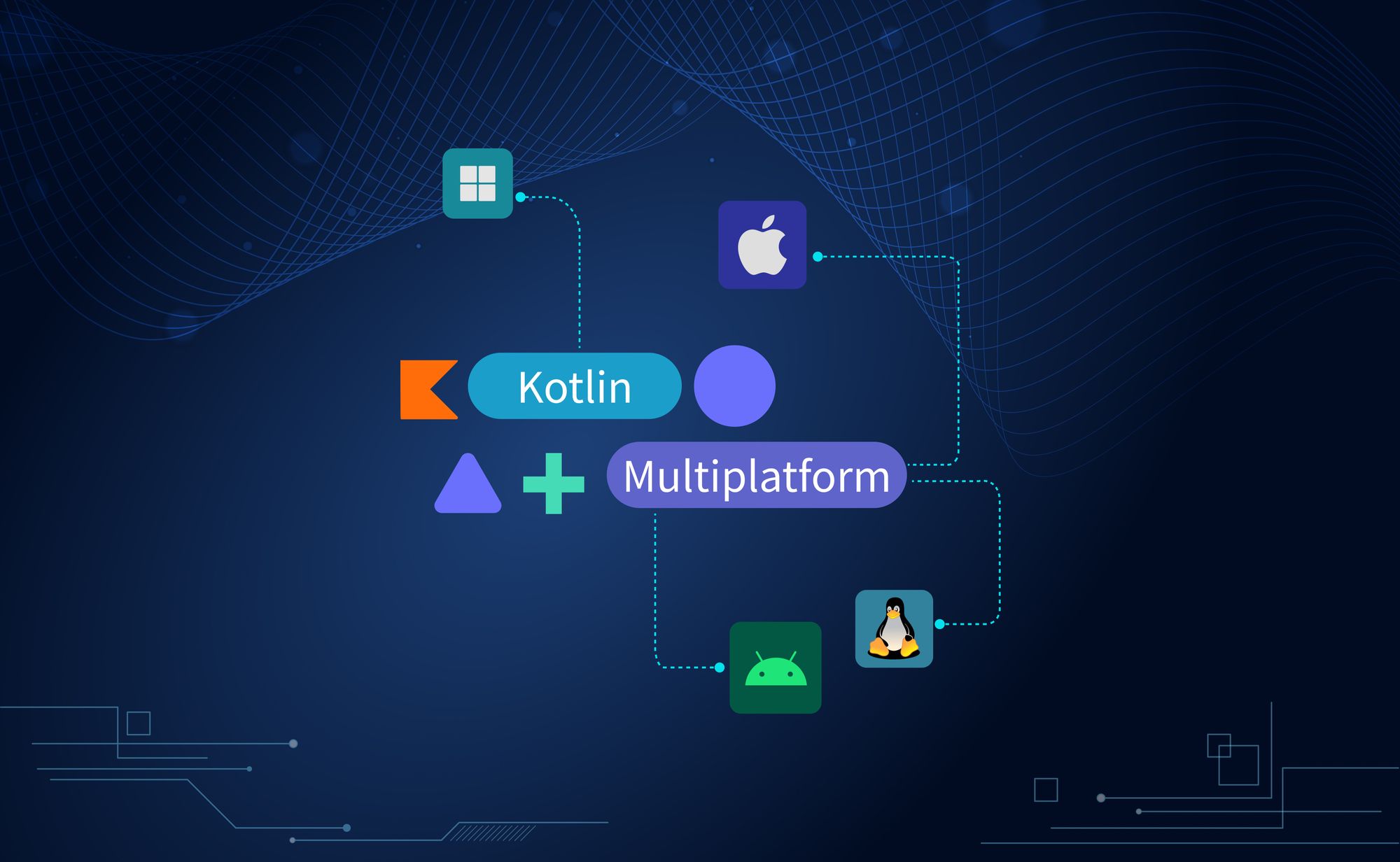
Kotlin Multiplatform
In software development's dynamic landscape, Kotlin Multiplatform (KMP) stands out, revolutionizing cross-platform projects. It's a game-changer, minimizing the effort spent on duplicating code across different platforms.
At its core, KMP merges native programming flexibility with a unified codebase, dramatically reducing development time. With KMP, a single code base effortlessly spans iOS, Android, mac OS, Windows, Linux, and beyond, promising true cross-platform compatibility in a nutshell.

How does KMP work
KMP, the code maestro, seamlessly orchestrates harmony across Android and iOS. Starting with shared business logic, KMP transforms it into a universal language for both platforms.
Android: JVM Ballet
- KMP choreographs a JVM ballet for Android.
- Code transforms into Java bytecode, harmonizing with the Android environment effortlessly.
iOS: Native Symphony
- For iOS, KMP conducts a native symphony.
- Code converts into native machine language, ensuring optimal performance without compromise on iPhones and iPads.
Kotlin Common Code
The Core Concept: Kotlin Common Code is the linchpin of Kotlin Multiplatform (KMP), embodying shared business logic across platforms.
Platform-Specific Compilers:
Kotlin/JVM: Transforms common code into Java bytecode for seamless integration with the Android ecosystem.
Kotlin/JavaScript: Converts code into JavaScript, enabling cross-platform compatibility for web development.
Kotlin/Native: Navigate non-JVM environments by converting code into native machine code, expanding compatibility.
Different code-sharing approaches with KMP
In Kotlin Multiplatform (KMP), flexibility reigns supreme. Code sharing ranges from minimal logic to complete UIs via Compose Multi platform:
Minimalist Sharing:
- Choose specific logic for sharing.
- Ideal for preserving platform uniqueness.
Intermediate Sharing:
- Share a substantial code portion.
- Balances efficiency with platform specifics.
Compose Multi platform:
- Unify logic and entire UI code.
- Revolutionizes the cross-platform experience.
Choose your KMP approach—minimalist, intermediate, or Compose Multiplatform. Stay tuned for real-world examples, diving into the dynamic realm of cross-platform development!


Comparison with other Cross-Platform approaches
In the cross-platform arena, Kotlin Multiplatform (KMP) stands out. It provides a single code base for iOS and Android, akin to other approaches, but with unmatched flexibility:
Platform-Specific Flexibility:
- KMP allows platform-specific code for unparalleled adaptability.
Liberation from Ecosystem Lock-In:
- Unlike Flutter or React Native, KMP frees developers from ecosystem constraints.
- Write native code anywhere in the application.
The KMP Advantage:
- Freedom to leverage framework-supported features or seamlessly integrate native code.
- Unparalleled adaptability without compromising cross-platform efficiency.

Advantages of Kotlin Multiplatform
In the programming world, Kotlin Multiplatform (KMP) stands as an efficient game-changer for developers:
Robust Support:
Widely adopted by organizations.
- Google's endorsement cements its role as the preferred Android language.
- Thriving community support encourages collaboration.
Efficient Code:
- Eliminates redundancy in cross-platform code creation.
- Swift common code sharing minimizes development time.
- Features like interoperability ensure speed without compromising on native platforms.
Accelerated Development:
- Code sharing equals swift and efficient development.
- Kotlin's attributes—null safety, IDE support, and Java interoperability—streamline complexity for faster results.
Unified Language for All:
- Breaks free from cross-platform tool limitations.
- Utilizes native capabilities on iOS and Android seamlessly.
- Smooth transition: Android apps adapt to iOS devices without extensive code modifications.
Companies Opting for Kotlin Multi platform
The impact of Kotlin Multiplatform (KMP) resonates across industry giants:
Netflix: Elevating UI
- Reimagined Android UI player with KMP.
- Seamless, cross-platform UI for an enhanced streaming experience.
Autodesk: Bridging Platforms
- Embraces KMP's native compatibility for iOS and Android.
- Streamlines cross-platform development without Java interface complexities.
VMware: The Go-To Framework
- Cloud computing giant selects KMP for cross-platform mobile apps.
- Optimal choice for streamlined development.
Trello: Project Management Simplified
- Adopts Kotlin for Android app development.
- Smooth transition facilitated by Kotlin's Java interoperability.
Philips: Accelerating Innovation
- Experience speed with KMP in implementing new features.
- Fosters collaboration between Android and iOS developers.
Ice Rock: Crafting Versatile Solutions
- Relies on KMP Mobile for diverse industry applications.
- Empowers seamless development for mobile and backend solutions.
Conclusion
In the journey through the realms of Kotlin Multi platform (KMP), we've navigated its intricate workings, explored diverse code-sharing approaches, and witnessed its adoption by industry leaders. As the curtain falls on this exploration, it's evident that KMP isn't just a technology; it's a transformative force reshaping the landscape of cross-platform development.
In conclusion, Kotlin Multi platform isn't just a tool; it's a catalyst for change. As it disrupts traditional norms, KMP opens doors to a future where developers wield the power to code efficiently, collaboratively, and without constraints. The journey with KMP doesn't end here; it marks the beginning of a new era in cross-platform development, where innovation knows no bounds.
Embark on this transformative journey with Kotlin Multi platform—where the language of code transcends platforms, and the future of development unfolds with boundless possibilities.

